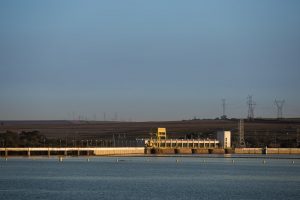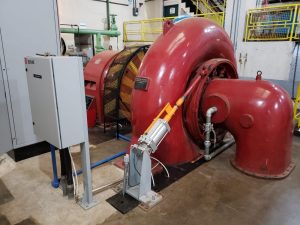Turbine Pneumatic Governor for hydropower plants
CTG Brasil
Turbine Pneumatic Governor for hydropower plants
CTG Brasil
 Back to Hall of Fame
Back to Hall of Fame
Hydropower has been known as one
of the major sources contributing
to renewable energy matrix around
the globe. In Brazil, for instance,
hydro generation corresponds
to about 62% of the total energy
production and considering the
total installed capacity, Brazil is in
the third position in the ranking for
renewable energy generation.
CTG Brasil carried out the R&D
project which consists of the
development of a prototype of a
servo-pneumatic unit to regulate
the speed of small hydraulic
turbines. The model was built on a
test bench in the laboratory of the
Federal University of Santa Catarina
(UFSC), where tests were carried
out to consolidate the research.
The pilot was applied at the 438
1
The importance of this project is
to validate the theoretical model
of this application that does
not exist in the market today.
This development meets the
requirements of automation and
control systems, in which safe
and accurate operation is vital
to maintain quality in the electric
power generation. In addition to
these performance requirements,
the robustness and costeffectiveness
of the equipment
were also considered.
The pilot developed was proven
to be 44% cheaper compared with
conventional, oil powered, speed
governor systems. Considering
the standard dimensions for
pneumatic cylinders according
to the ISO 15552 Standard, the
estimated maximum actuation
force of the regulating ring, and
the sizing process proposed, it can
be estimated that the pneumatic
solution is capable to withstand
the operational conditions and
attend the dynamic requirements
of hydropower plants up to 5MW,
which can be fully automated
with pneumatic technology with
significantly lower costs than
traditional systems.

Highlights
- The product was developed from a Research & Development project by CTG Brasil. The equipment is already operational and is undergoing the latest commissioning tests at Salto Grande HPP.
- The project went through the design phase and preparation of materials and equipment needed for development.
- The project included the design and assembly phase of the laboratory test bench for the air pressure system.
- The new pneumatic speed governor system developed was compared to a traditional oil speed governor. The results show that all the necessary standards were meet at a cost 44% lower.
- The prototype was installed at Salto Grande HPP and field tests began.
View Website
 Back to Hall of Fame
Back to Hall of Fame
Hydropower has been known as one
of the major sources contributing
to renewable energy matrix around
the globe. In Brazil, for instance,
hydro generation corresponds
to about 62% of the total energy
production and considering the
total installed capacity, Brazil is in
the third position in the ranking for
renewable energy generation.
CTG Brasil carried out the R&D
project which consists of the
development of a prototype of a
servo-pneumatic unit to regulate
the speed of small hydraulic
turbines. The model was built on a
test bench in the laboratory of the
Federal University of Santa Catarina
(UFSC), where tests were carried
out to consolidate the research.
The pilot was applied at the 438
1
The importance of this project is
to validate the theoretical model
of this application that does
not exist in the market today.
This development meets the
requirements of automation and
control systems, in which safe
and accurate operation is vital
to maintain quality in the electric
power generation. In addition to
these performance requirements,
the robustness and costeffectiveness
of the equipment
were also considered.
The pilot developed was proven
to be 44% cheaper compared with
conventional, oil powered, speed
governor systems. Considering
the standard dimensions for
pneumatic cylinders according
to the ISO 15552 Standard, the
estimated maximum actuation
force of the regulating ring, and
the sizing process proposed, it can
be estimated that the pneumatic
solution is capable to withstand
the operational conditions and
attend the dynamic requirements
of hydropower plants up to 5MW,
which can be fully automated
with pneumatic technology with
significantly lower costs than
traditional systems.
Highlights
- The product was developed from a Research & Development project by CTG Brasil. The equipment is already operational and is undergoing the latest commissioning tests at Salto Grande HPP.
- The project went through the design phase and preparation of materials and equipment needed for development.
- The project included the design and assembly phase of the laboratory test bench for the air pressure system.
- The new pneumatic speed governor system developed was compared to a traditional oil speed governor. The results show that all the necessary standards were meet at a cost 44% lower.
- The prototype was installed at Salto Grande HPP and field tests began.




